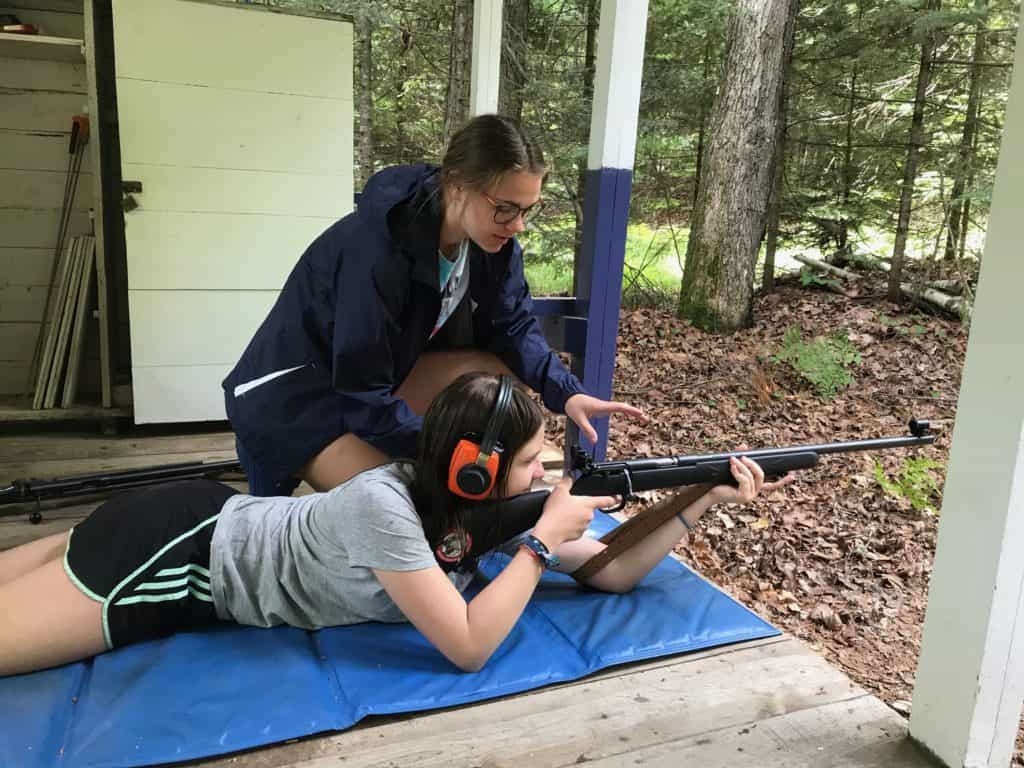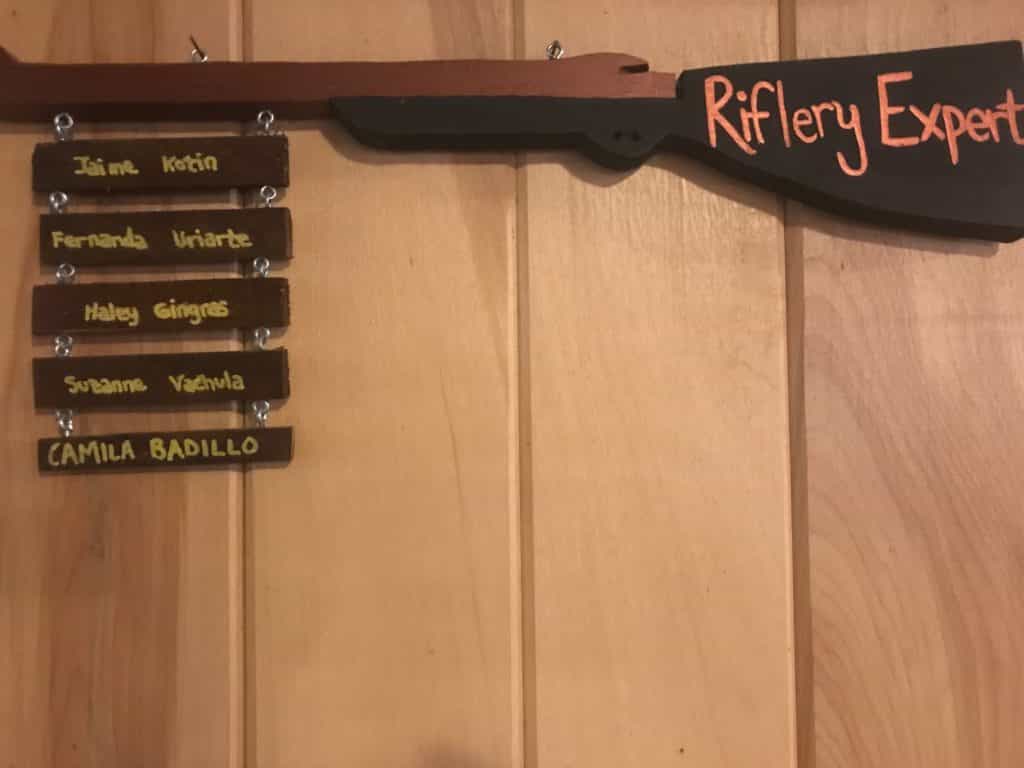Category: Activities at Camp
Summer Learning Without Homework or Grades
 I think it is safe to say that our campers have made their “back to school” debut for the 2024-25 year. Backpacks filled with a beach towel, sweatshirt, tennis raquet and riding boots from the summer have been traded in for one that carries lunch, completed homework, a calculator, and a binder or two. It is exciting to dive into the topics that each grade will explore for the new school year. Let the learning begin! Or, should I say, let the learning continue?!
I think it is safe to say that our campers have made their “back to school” debut for the 2024-25 year. Backpacks filled with a beach towel, sweatshirt, tennis raquet and riding boots from the summer have been traded in for one that carries lunch, completed homework, a calculator, and a binder or two. It is exciting to dive into the topics that each grade will explore for the new school year. Let the learning begin! Or, should I say, let the learning continue?!
So often, we hear about the learning loss that occurs during the summer from having too much time away from school. As a teacher who has spent 35+ summers at camp, I would like to propose that children who go to summer camp, actually experience just the opposite. Kids who spend their summer at camp have a learning surplus. While I do not have any scientific data to back this claim, I can share with you what your campers reported learning during the recent summer.
STRAIGHT FROM THE MOUTHS of our CAMPERS:
Towards the end of camp, each girl had the opportunity to share her thoughts on the activity “they learned the most” (all campers whose form we received are included here). Based on the wording of the question that was asked, their responses are (mostly) activity based; however, there are a few campers who recognized other kinds of learning that occurred in the Open New Doors in ’24 summer. Campers also shared the camp activities they wish they could do at home – it is interesting to see the differences in the “favorites” from cabin to cabin.
Sunrise
Jacinta: swimming (front/back crawl and elementary backstroke); Milly: gymnastics (lots of skills on floor, beam, and bars); Sloane: sailing (parts of the boat); Reggie: swimming (sidestroke); Fiona: tutoring (becoming a stronger reader and writer); Mara: swimming (elementary backstroke)
 Activity I wish I could do at home: arts & crafts (2), sailing (2), tennis (1)
Activity I wish I could do at home: arts & crafts (2), sailing (2), tennis (1)
Silver Birch
Liza: riflery (how to safely shoot a gun); Georgia: riding (you can steer a horse with your legs and without using reins); Audrey: tennis (game of touch-the-fence); Amelia: swimming lessons (sidestroke); Lucia: tennis (queen-of-the-court game); Luci: swimming/arts & crafts (Jackie taught me strokes during swimming lessons); Eleanor: tennis (game of touch-the-fence); Lizzy (CIT): drama (patience and teaching when stressed!).
Activity I wish I could do at home: riflery (2), sailing (1), fishing (1), drama (1), arts & crafts (2), archery (1)
Starshine
Maria: riding (put your heels down); Evie: sailing (parts of the boat); Dani: archery (learning how to shoot to get qualifying targets); JoJo: riding (always post while trotting, otherwise, the horse thinks you want to canter); Jaclyn: archery (how to shoot to hit the target consistently).
Activity I wish I could do at home: gymnastics (2), riding (2), archery (2), rec swim (1), riflery (1)
Lia: arts & crafts/sailing (how to make a pillow and make a mooring); Clara: sailing/riding (I now know the race rules in sailing); Emilia: riding/sailing/tennis (all kinds of cool stuff!); Elyse: swimming/riding (how to do a stride jump and trot better); Indira: sailing/arts & crafts (parts of a boat); Alice: archery (how to hold the string in the first crevice of your fingers; Julia: sailing (parts of a boat); Masyn: gymnastics/swimming (I can now do a front limber/walkover); Mojo: riding/sailing (what to do when you run aground).
Activities (this cabin listed multiple!) I wish I could do at home: rec swim/swim (2), riding (3), sailing (4), water-skiing (1), archery (3), riflery (2), fishing (1), tennis (1)
Driftwood
Ana Roberta: tennis (grab the raquet or follow the ball); Casi: sailing (rules of the road and how much fun it is); Ren: swimming/tennis/sailing (parts of a boat); Olivia: fishing (how to fish); Maggie: gymnastics/riflery (front walkover and how to shoot a gun); Delia (CIT): sailing (learned how to teach sailing to others)
Activities I wish I could do at home: sailing (2), rec swim (2), riflery (1), archery (1), gymnastics (1)
Maria: swimming (different ways to swim/strokes); Amelia: riflery (how to shoot); Maddie H: arts & crafts/swimming (how to make flowers); Hannah: sailing (what a gunnel/gunwale is on a boat); Olive: riding (how to do a sitting trot); Maddie B: drama (finding your mark or where you stand on stage and how you should say your lines) Lou (CIT): sailing (mentality and attitude)
Activities I wish I could do at home: archery (1), arts & crafts (1), archery (3), drama (1), riding (2)
Norah: sailing (how to rig a boat); Julia: sail race (terminology and how a sail race works); Sydney: swimming/sailing (parts of a boat); Karen: tennis (how to hit the ball correctly); Clara: riding (improving my previous skills); Taylor: tennis/sail race (US Olympic sailing rules); Regi: drama (practiced stage presence); Phoebe: riding (how to be more efficient and do things in the barn)
Activities I wish I could do at home: sailing (3), sail race (2), archery (2), riflery (2)
Mariana: sailing (hard to pick just one thing!); Ana Lau: tennis (how to play the game); Katherine: sail race/riding (how to use the wind to my advantage); Izzy: riding (how to jump while on a horse); Elizabeth: sail (better racing tactics); Ivana: sailing (advanced knowledge); Amalia: sailing (rules of sailing); Stella: tennis (how to properly serve a tennis ball); Vale: sailing (terminology and how to go faster)
Activities I wish I could do at home: sail race (1), sailing (4), water-skiing (4), riding (2), archery (1), riflery (1)
 Aquarius (these girls are BUSY at the end of camp, so we didn’t get everyone’s form!)
Aquarius (these girls are BUSY at the end of camp, so we didn’t get everyone’s form!)
Ivana: dance (how to dance to harder songs and choreographing); Robs: archery (how to shoot properly); Lilah: riding/tennis (learning how to make the switch from the horse fearing you and not you fearing the horse)
Activities I wish I could do at home: riflery (1), archery (1), tennis (1)
As you can see, there is no such thing as learning loss while spending an amazing summer at camp! The typical day at camp is packed with learning experiences that are EVEN BETTER than a typical day at school (and without homework or grades!). And that is coming straight from the keyboard of a math teacher!!!
ENROLL for SUMMER 2025
To continue the learning curve during the summer months, now is a GREAT time to enroll your camper/s for 2025 and reserve your spot/s. Sign up HERE: https://cwtp.campbrainregistration.com
Befriending Fears at Camp
 I was an anxious kid. Life, for me, meant constantly fighting an incessant stream of questions like what if that plagued my mind. But there was an escape–spending the summer at Camp Woodland. At camp I took six activities, the same every year: swimming lessons, free swim, riflery, archery, tennis, and horseback riding. The familiarity of my camp routine distracted me from facing anything unknown. There was a simplicity in my regimen that I clung to for most of my early summers. I never wanted to try any new activities for fear of embarrassment and failure. So, I stuck to what I knew. My activities were like old friends. I knew them blind. That worked perfectly for three summers, until my fourth year, when I was placed in a more advanced horseback riding hour and my little world flipped on its head.
I was an anxious kid. Life, for me, meant constantly fighting an incessant stream of questions like what if that plagued my mind. But there was an escape–spending the summer at Camp Woodland. At camp I took six activities, the same every year: swimming lessons, free swim, riflery, archery, tennis, and horseback riding. The familiarity of my camp routine distracted me from facing anything unknown. There was a simplicity in my regimen that I clung to for most of my early summers. I never wanted to try any new activities for fear of embarrassment and failure. So, I stuck to what I knew. My activities were like old friends. I knew them blind. That worked perfectly for three summers, until my fourth year, when I was placed in a more advanced horseback riding hour and my little world flipped on its head.
 I had ridden horses for three summers by then, but the prospect of being in the advanced hour, surrounded by older, skilled riders, made me so anxious I felt sick. I had caught glimpses of the pasture during these sessions and seen blurs of beige and brown, clouds of kicked-up dust, and what seemed like impossibly fast speeds. I was certain that the second I mounted any horse going that fast I would be flung off and land somewhere in the trees.
I had ridden horses for three summers by then, but the prospect of being in the advanced hour, surrounded by older, skilled riders, made me so anxious I felt sick. I had caught glimpses of the pasture during these sessions and seen blurs of beige and brown, clouds of kicked-up dust, and what seemed like impossibly fast speeds. I was certain that the second I mounted any horse going that fast I would be flung off and land somewhere in the trees.
My first day in riding left me in tears. I already felt miles behind my peers. I trooped, defeated, back to the cabin, and I was in no mood to unpack the day with my friends, so I sat on the porch in the sinking sunlight alone. The door creaked open and my live-in CIT, a girl named Arantxa, sat beside me. She introduced herself, but said nothing. I was grateful for the silence. Her presence was comforting enough, as if she was letting me though she was there for me. She would wait until I was ready to talk.
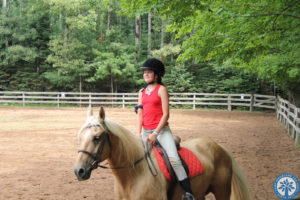 Day after day, I wandered out to the porch. When I felt like crying after being reminded again and again I was the worst in my class, I found some semblance of solace on the rickety cabin steps. Arantxa came out and sat with me every day. Eventually, I began to tell her about riding and my debilitating fear each time I walked into the barn. I confessed I wanted to quit. She frowned. “The fear you have,” she said, “is not something to run from. You have to accept your fear. Live with it. Free it, and it will make you better. Don’t quit riding because you’re scared. Just keep going.”
Day after day, I wandered out to the porch. When I felt like crying after being reminded again and again I was the worst in my class, I found some semblance of solace on the rickety cabin steps. Arantxa came out and sat with me every day. Eventually, I began to tell her about riding and my debilitating fear each time I walked into the barn. I confessed I wanted to quit. She frowned. “The fear you have,” she said, “is not something to run from. You have to accept your fear. Live with it. Free it, and it will make you better. Don’t quit riding because you’re scared. Just keep going.”
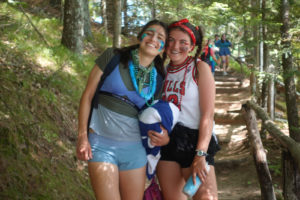 Those words kept me enrolled in riding for the next six weeks. She was right, I was afraid–that never went away. But Arantxa helped me befriend my fear. I made peace with it, and understood that its very existence was proof that I was growing. Growth, I learned, was not what resulted from natural skill or prowess. It was earned from that uncomfortable in-between, that space where what if still pestered me. But this time I was armed with the tools to twist what if into something powerful. Something hopeful. Instead of asking, what if I fail? I found myself asking, what if I succeed?
Those words kept me enrolled in riding for the next six weeks. She was right, I was afraid–that never went away. But Arantxa helped me befriend my fear. I made peace with it, and understood that its very existence was proof that I was growing. Growth, I learned, was not what resulted from natural skill or prowess. It was earned from that uncomfortable in-between, that space where what if still pestered me. But this time I was armed with the tools to twist what if into something powerful. Something hopeful. Instead of asking, what if I fail? I found myself asking, what if I succeed?
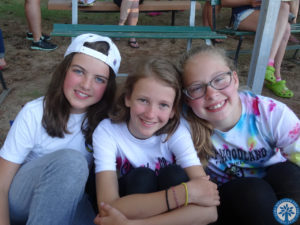 We had a horse show on the last day of camp to demonstrate all of our acquired skills. I mounted my horse, welcoming the flutter of anxious butterflies in my gut. Scanning the crowd, I saw my friends beaming at me. But something else caught my attention: Arantxa, breathless from running to escape her CIT duties, stood at the fence with a handmade sign drawn just for me. She waved and smiled, and warm pride bloomed inside my chest. As I rode around the arena, I felt like a blur of beige and black, fast and flying, ready to take on the world. I knew then that I could conquer any activity, any obstacle, and any challenge in my way.
We had a horse show on the last day of camp to demonstrate all of our acquired skills. I mounted my horse, welcoming the flutter of anxious butterflies in my gut. Scanning the crowd, I saw my friends beaming at me. But something else caught my attention: Arantxa, breathless from running to escape her CIT duties, stood at the fence with a handmade sign drawn just for me. She waved and smiled, and warm pride bloomed inside my chest. As I rode around the arena, I felt like a blur of beige and black, fast and flying, ready to take on the world. I knew then that I could conquer any activity, any obstacle, and any challenge in my way.
This blog was originally written by Molly K as an influential figure essay for a college-prep English class assignment. We are excited to have Molly join our staff team in 2023!
The Start of Something New
Now that the first 2 weeks are behind us, campers are more than ready to expand their horizons and take a deep dive into all the opportunities for fun and adventure at camp. Every day except Sundays, campers take activities that they can choose themselves. Today was especially delightful because it is the first day of the 2nd sign-up of activities.
Every other weekend at camp, campers choose their next round of six activities that they will take for 2 weeks. Some campers enjoy taking the same activities every time because they want to continue building their skills, they particularly enjoy being with those activity instructors, or they are just big fans of that activity. On the other hand, some campers choose new activities every rotation in order to try the most they can while at camp, since many of our activities are things that are often not available at home. Either way, campers practice decision-making and independence when they pick activities and challenge themselves to try new things.
At the waterfront, campers learn to swim, ski, knee or wakeboard, sail, windsurf, paddleboard, and canoe. They also can enjoy Rec Swim each afternoon and play on the water mats, take a try at log rolling, or catch a ride with a friend and tour around the lake on the Atom.
Meanwhile on land, campers try their hand at archery, riflery, tennis, gymnastics, dance, drama, horseback riding, farm zoo, and arts & crafts. So hard to choose – each activity is a ton of fun!
No matter the activity, campers are able to take something away with them when they leave camp. Whether it is a freshly honed skill in knot tying (sailing), an experience on horseback they’ve never had before, or a new friend they made in arts and crafts, each camper heads home with more than they arrived with. The combination of immersion in nature, working with activity specialists, and daily opportunities to build both skills and relationships make activities at Woodland a unique learning experience.
Note: This blog post was inspired by Rockbrook Camp (NC).
Come Sail Away With Me at Camp Woodland
This week we are heading down to the waterfront to take a look at sailing, one of Camp Woodland’s “anchor” programs. Sailing is offered five periods every day, with 2 back-to-back hours of sail race for the more advanced girls. Sailing is an experience where campers learn valuable problem solving and creative thinking techniques along with life skills for the future. We offer basic through advanced levels of sailing, focusing on the fundamentals while having a great time on the water.
Here are some of the most important things campers learn in the Camp Woodland sailing program:
- Water Safety: Before we start sailing at camp, we teach important water safety tips like how to properly wear and secure a life jacket, what to do to maintain control of the sailboat, and how to remain calm when we encounter challenges on the water. Learning about various cloud formations and weather patterns is another added benefit to learning how to sail!
- Rigging the Boat: Campers also learn about all the different wires, ropes and lines that support the rig and control the sails. We teach them how to get the boat ready to sail and how to control the boat while you’re sailing. Understanding how the sailboat works helps campers be more confident and makes sailing more fun. The Woodland fleet consists of X-boats, Sunfish, Hobies, and windsurfers. Over the course of the summer, campers have the opportunity to try their hand at sailing the various classes of boats.
- Finding the Wind: Some sailboats have special instruments that help measure the wind speed and find the direction of the wind, but there are other ways to know where the wind is going and how strong it is. Campers learn to be creative when finding the wind by watching for waves and paying attention to which way the telltale (piece of string attached to the sail) moves when a breeze comes. We call upon Zulu, Woodland’s very own wind god, to give us many good sailing days on Sand Lake!
- Basic Boat Handling: Campers gain practice steering and maneuvering the boat when sailing. This means learning how to turn, speed up, slow down the boat, and avoid obstacles in the water. Having a sense of direction and spatial awareness through sailing experience will be beneficial down the road, especially when learning how to drive. Woodland’s extremely competent sailing instructors take the helm at the beginning of the summer, and soon after, campers take command of their boat and crew. What a great confidence booster!
- De-rigging and Boat Care: It is just as important to know how to take down the rigging when you are done having fun on the water. Campers are taught to put all the rigging equipment and parts away properly, and to work as a team to make sure the boats stay clean and are well cared-for. We are all responsible for maintaining the boats so they are ready for the next group to enjoy them as well. Wouldn’t it be nice if kids kept their bedroom at home in shipshape order, too?!
References: blogs by L Johnson, a sailing camp director in Nashville, TN and 5 Reasons Kids Should Sail
Take Aim at Camp Woodland Target Sports
This week we are taking aim at the Target Sports program at Camp Woodland. Both Archery and Riflery are popular activities at camp – there are 11 total classes offered for 2nd sign-up! If we head up to the range, these individual sports provide opportunities for many skills beyond shooting either a bow and gun to be practiced and developed.
Archery is about focus and consistency. Archers pick a point down range and focus their aim and then work to have consistent bow placement and pull in addition to having a consistent stance. Campers practice patience, concentration, tenacity, persistence, goal setting and how to overcome frustration when the arrow doesn’t quite stick where they would like it to go! Instructors Caroline, Alexis, and Sofia S with the help of CIT assists Sofia G and Valentina coach campers to make small adjustments that often make a big difference in accuracy. There is a lot of self-talk in target sports and listening to that “little voice” in your head that is saying, “you got this!”
Campers set goals to pass levels that increase in difficulty based on overall distance from the target and number of points needed. Beginner archers start out by working for their White Yoeman (shooting at 10 yards for 80 total points). Next are White Bowman (10 yards for 120 points) and White Archer (10 yards for 180 points). As proficiency is achieved, beginner archers move on to farther distances with the ultimate goal of becoming of one of Woodland’s famous “Golden Archers” (50 yards).
Success at the riflery range relies on the ability of the shooter to simultaneously focus on the target and her position. Campers learn to hold their breath as they take aim and shoot. They also work on using the strap to stabilize and provide correct placement of the gun. In time and with the help of Instructors Daphne and Aranxta and CIT assists Amelia, Estefi, and Barbie, campers find the right position that prevents their elbows from giving a steady aim. Campers also learn how to score their own targets so that they can keep track of their progress.
At Woodland, there are 14 levels in the riflery program that provide a graduated challenge of distance and accuracy at four different positions. Campers begin learning to shoot in a prone position and then progress to sitting, kneeling, and finally standing. To pass the first level (Pro-marksman) campers must score 20 points from the prone position. Accuracy increases by 5 points at each level until 40 points is reached for the various positions before advancing. The final rank in Woodland’s riflery program is Expert, where a camper works to shoot a score of 40 from 5 shots, standing. It takes a lot of patience and persistence over the course of multiple years to reach this goal!





















